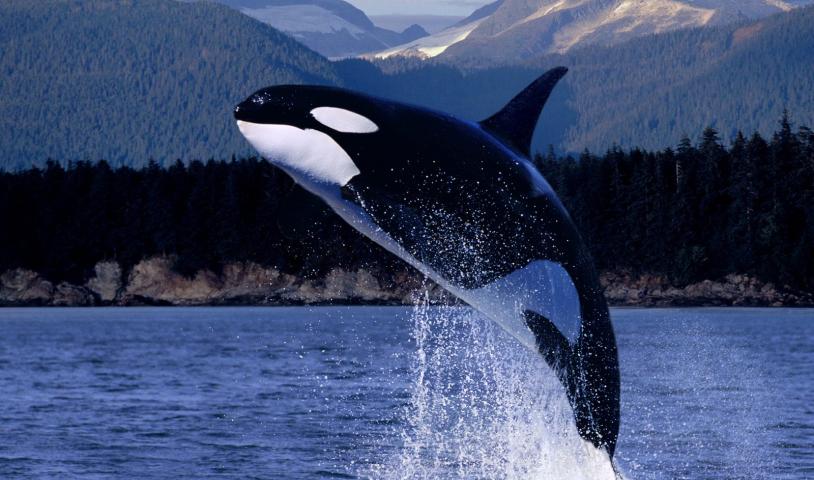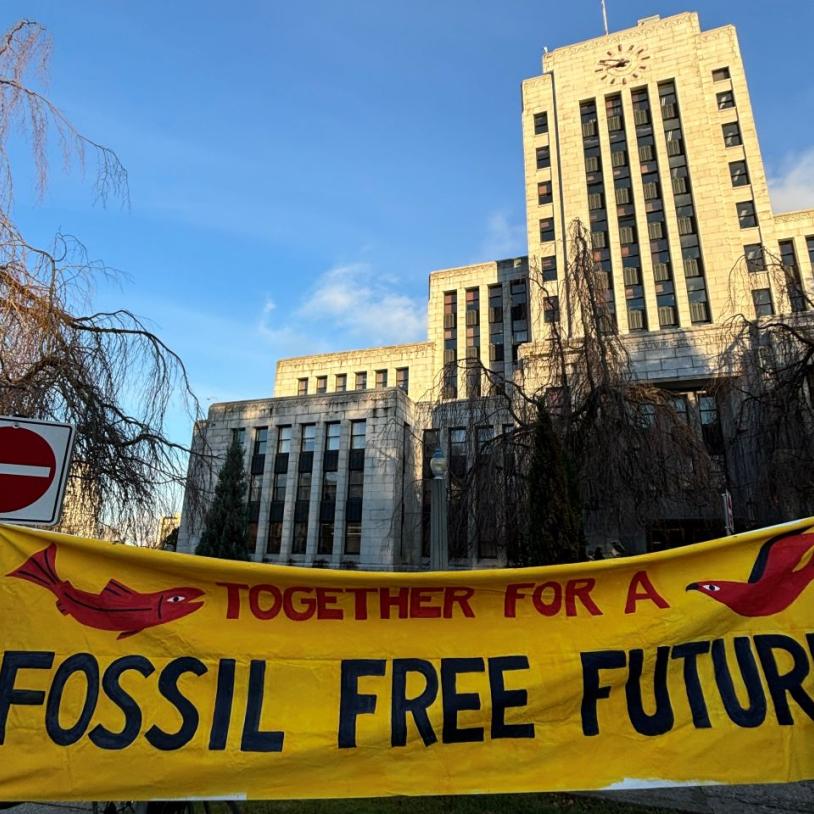Orcas vs oil: Tankers threaten our Pacific coast
Monday, June 6, 2011
A couple weeks ago a pod of orca whales made their way under the Lions Gate bridge and up Burrard Inlet.
This rare sighting of the iconic whales so close to Vancouver thrilled tourists and locals alike -- some even took it as a sign that the Canucks were destined to win the Stanley Cup this year! But this unusual event was also a stark reminder of what is at stake as we struggle to protect the BC coast.
Our fragile and beautiful coastal waters are arare and precious jewel. They are home to orcas and countless other species that make BC such a special place.
Crude oil tankers pose a serious threat to this magical place we call home. If a crude oil spill were to occur on our coast, the impacts would be truly awful. After the Exxon Valdez spill, 23 resident or transient killer whales disappeared from the area, many of which were presumed dead due to the direct effects of oil on the animals. The impacts of the Exxon Valdez spill decades ago are still being felt by many effected species and individuals.
Of course, it’s not just the orcas that would be effected. In fact they are better protected than many ocean species because of their thick layer of blubber, unlike birds, fish and many other species. Oil in the water works its way up the food chain, exposing all life in the region to harmful toxins.
What most people don't know is that, already, two tankers a week are passing through Burrard Inlet. And each tanker carries three times as much oil as was spilled by the Exxon Valdez!
How did this dangerous and alarming situation come to be?
Most Vancouverites are unaware that in 2007 safety regulations were, very quietly, rolled back by a panel made up largely of industry representatives, allowing bigger crude oil tankers to travel through Burrard Inlet in order to export tar sands bitumen to China and elsewhere in the Asia pacific region.
Vancouver has become a tar sands shipping port. It happened right under our noses. And the worst part is that this is just the beginning.
What’s next? Well Kinder Morgan has plans to expand their Trans Mountain pipeline from Alberta to Burnaby. Right now it moves 300,000 barrels a day of crude oil, 50,000 barrels of which is currently exported in tankers. They hope to expand their pipeline by 80,000 barrels a day, all for the sake of export. They have also applied to the National Energy Board to reduce the amount being refined locally and increase the volume being export by six times the current volumes. That means six times the current risk in the Vancouver harbour and of course a spill anywhere on our coast would effect the entire coast as the spilt oil is carried by the tides.
Even without tankers involved, these oil pipelines can do massive damage. The Trans Mountain pipeline ruptured in a Burnaby neighbourhood a few years ago and again leaked in Alberta earlier this year.
Meanwhile Enbridge is about to go into public consultation on their proposed Northern Gateway pipeline. This monstrosity would carry 700,000 barrels a day of petroleum products though invaluable BC wilderness, crossing over 1,000 streams and rivers all for the sake of crude oil exports.
Enbridge claims that this would be perfectly safe but the Enbridge pipeline through Michigan ruptured last year in Kalamazoo and they won't even pay the clean up costs, let alone help the folks whose health has been negatively impacted.
In the time since that spill, we also had two spills from the Keystone pipeline and a spill from the Transmountain pipeline and of course the biggest spill in Alberta history - the Rainbow pipeline. There are expansion proposals for all three of those pipelines. The potential impacts on human health, as well as on biodiversity, could be severe if more of these spills continue to happen. The truth is, when it comes to oil spills, it's not a matter of if it will happen; it’s simply a matter of when it will happen.
Of course, even without an oil spill, in the age of climate change the last thing we should be doing is expanding oil extraction and exports. The Onion News recently did a funny piece entitled, "Millions Of Barrels Of Oil Safely Reach Port In Major Environmental Catastrophe." The article sarcastically states:
"We're looking at a crisis of cataclysmic proportions," said Charles Hartsell, an environmental scientist at Tufts University. "In a matter of days, this oil may be refined into a lighter substance that, when burned as fuel in vehicles, homes, and businesses, will poison the earth's atmosphere on a terrifying scale."
The funny (and scary) thing is that it's true. The problem wouldn't be solved for us or the orcas if there is no spill. Building new pipelines is exactly the opposite of what we should be doing in the era of climate change.
The good news is that, as British Columbians, we have the opportunity to do something significant to help reduce the global dependence on fossil fuels while simultaneously protecting our coasts from an oil spill. A ban on oil tankers off the coast is widely supported by BC residents, and if we can accomplish this we will be able to punch way above our weight in the fight against climate change. We are the last line of defence between the oil sands and the expanding markets in Asia and the American west coast.
Let’s act now!
We need smart transportation and land use planning that reduces the demand for oil, at the same time as limiting the supply by banning tankers off our coast.
We can and must lead the way, let’s be like the orcas that learn to adapt to their surroundings and survive. There is a lot we could learn from these intelligent creatures.
First and foremost their appearance in Burrard Inlet last month should serve as a stark reminder of the need to respect life in the wild.
We are holding meetings, together with our allies from Tanker Free BC, every Wednesday at 6pm at the Wilderness Committee office, on the top floor of 341 Water Street in the Gastown district of Vancouver.
This Thursday, June 9, I will be speaking at a public meeting which will also one of North America’s leading voices on the threats posed to our oceans by Big Oil. Antonia Juhasz is a US-based author and activist, and this event will be the Vancouver launch of her book, Black Tide: The Devastating Impact of the Gulf Oil Spill. The BP disaster should serve as a cautionary tell for the world, and for those of us here in Vancouver whose harbour is quickly becoming a key point of export for crude oil from the tar sands. The Thursday event gets started at 7pm at the new W2 Media Arts Cafe at 111 W. Hastings.
For more information about the campaign to ban oil tankers from our coast visit WildernessCommitteee.org/tankers
Ben West | Healthy Communities Campaigner
Wilderness Committee





